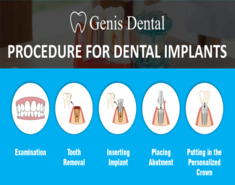A dental implant is a medical treatment that involves replacing a missing tooth. The implant is a surgical accessory fitted into the jawbone in the place of the missing tooth. It is incorporated into the mouth within a short period. Gradually, artificial dental implants completely take the position of the tooth and function on its behalf.
The implant is chosen and carefully placed so that it can act as a natural tooth and give support to nearby teeth. Implants are made of titanium that can easily blend into the jaw and not stand as a separate entity. Advancements in technology have made it possible to improve the process of dental implants, and the success rate of this tooth replacement treatment is 98%. Your dentist will weigh the pros and cons of getting dental implants before scheduling surgery.
Know The Full Procedure For Dental Implants

The exact procedure of a dental implant depends on your needs, situation, and case history. If you need an Emergency Tooth Extraction, there may be different options that can be personalized for you. In addition, the healing time can vary from person to person.
- Examination
The first step is an examination of your unique situation. Your dentist might suggest tests like X-rays or scans to correctly evaluate your teeth and mouth. Next, dentists will specify the number of teeth that need to be replaced. They will also get your medical history and conditions to ensure your safety. Medical practitioners can prescribe medications to support the procedure and reduce post-surgical pain.
- Tooth Removal
Sometimes dental implants involve only the placement of the implant. But, often, the original tooth must be removed. So, before placing the implant, the dentist removes the previous tooth. Then, the implant will be placed in the same area. Usually, the procedure of tooth removal is quick.
- Inserting Implant
The implant is placed in the jawbone or inserted into the gums. Dentists recommend different methods for different individual needs. The implant then slowly blends with the jawbone or gum line, but full integration can take some time.
- Placing Abutment
An abutment can be placed after a period of time to ensure the strength of the implant. It is a small piece of titanium or zirconium. Abutments need to be strengthened to ensure proper linkage and avoid slipping. They also aid the gum tissues near the implant site in healing.
- Putting in the Personalized Crown
Depending on whether you prefer a temporary or permanent dental implant, your dentist will select the appropriate one for you. The dentist formulates your implant and fixes it accordingly with a surgical procedure. Minor modifications from your tooth and implant are safe and can be expected. While it is typically a painless procedure, you might feel a little pressure in the area. Anesthesia can ensure that nothing more than slight discomfort is felt.
The Exclusive Different Kinds Of Dental Implants
- Zygomatic Implants: Zygomatic implants are safe but no longer commonly used. It is typically preferred if you suffer from extreme bone loss in the upper jaw. These implants are usually tilted in shape and placed in the jawbone. Dentists must carefully check the length of these implants based on the person’s cheekbone to ensure a perfect fit.
- Endosteal Implants: These implants are used a majority of the time. It is placed inside the jawbone.
- Subperiosteal Implants: These are used for individuals with weak jaw bones that are difficult or impossible to correct. They comprise a metal frame attached just below the gum tissue above the jawbone.
The Truth About Who Needs A Dental Implant?
A Dental Implant Procedure aims to revive the function of a missing tooth or a set of missing teeth. If you feel you need this dental procedure, select well-known dentists for their efficiency in inserting the implants.
The following are 3 of the most common options for dental implants:
- To replace a complete or partial set of dentures
- To cement a dental bridge
- To replace a single non-functioning tooth
The Promising Average Cost Of Dental Implants
A dental implant procedure must include follow-up appointments, crown placement, and abutment expenditures. While it can be expensive depending on the unique situation, it can also bring smiles back to life. As with a good deal of health-related investments, taking action today can prevent your oral health from getting worse and save you from more hefty expenses later on. Moreover, cost varies per the dentist’s experience, materials used, and specific type of procedure.
Dental Implants Procedures Offer Many Terrific Benefits
- Enhance your appearance
- Bring back your lovely smile
- Restore your natural speech
- Boost your confidence
- Enable easy chewing
- Protect other teeth from damage
- Support surrounding teeth
- Prevent bone loss
- Provide mouth comfort
- Improve facial structure
Know About The Revealing Risks Of Dental Implant Procedures
Dental implants can provide many benefits, but as with any procedure, there are certain risks and potential problems. Usually, it’s an adjustment issue, not an ample cause for concern. However, it would be best if you keep the following in mind:
- A dental implant procedure may sometimes cause infection at the implant site. Typically, this heals in 3-5 days with antibiotics.
- If an implant of the upper jaw extends into the sinus cavities, it could cause sinus problems.
- The jawbone may occasionally not fuse properly to the implant, causing a loose fit.
- Significant pressure on the denture implants might lead to an implant fracture.
Many of these problems depend on how efficiently the dentist performs the surgery. An experienced dental surgeon can lessen the risk of side effects.
If you wish to get your smile back and say goodbye to any teeth and mouth-related issues, choose Genis Dental. They have a Dentist In Philadelphia who can help you be pain-free and regain your confidence.
